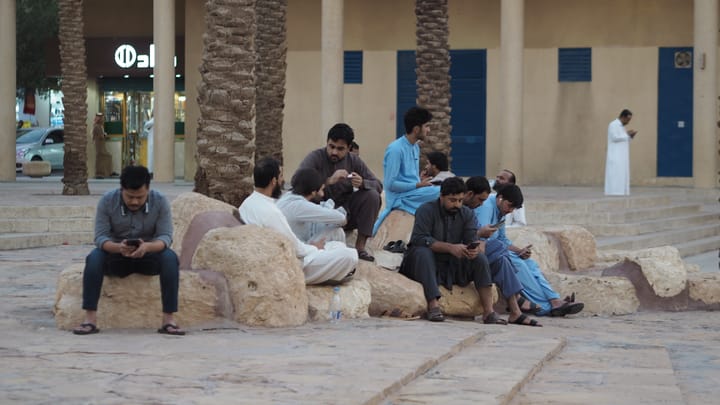the yobbism of the given
The tenets of civilisation are now being written by the authors of the gravest barbarity. Times have changed since Walter Benjamin’s day.
I’m informed I’m up to 1,990 posts and 298 pages. My father before he died said, Life is too short to read square white world.
Space is a social construct within the many, many, many dimensions of time. The notion offers no consolation to people who cannot negotiate the space they’re in, like animals, in the words of the title of Gilles Châtelet’s book–To Live and Think Like Pigs: The Incitement of Envy and Boredom in Market Democracies.
Justin Clemens reviewing my doctoral thesis lauded the concept of minoritarian conventionalism. I had a very specific context when I came up with the idea, a group formed around my practice, Minus Theatre.
We can choose the conventions we follow so long as we limit the number of people included in the subject, we. If we do not we are bound to follow the conventions of the space and spaces we inhabit, the same for any other animal in its habitat.
The point is elective rather than selective. It’s out of habit that we say the sun will rise, and rise in the West; the beginning of science fiction: the sun rose in the East.
Deleuze follows the line of Spinoza, Hume and Nietzsche, on his own and then with Guattari. This line is not of good sense and public morality and not, according to the conventions, determined to be natural and belong to human nature, we have no choice but to accept, of common sense.
I have left Bergson out but he can be placed anywhere in relation to the other points on the line, which are, a body’s powers of action are in relation to its power to be affected (Spinoza), custom is to the social as habit is to the individual: both may be chosen (Hume), and the social is the sum result of the choice of those forces that would affirm it in its values and that only return through the individual’s re-affirmation of them, that is, as resentment (Nietzsche). All three concern the basis of freedom that Bergson leaves undefined because it is in indetermination.
…
Music, the answer is music. “He had the great courage to place his knowledge and energy at the service of a cause that could never be won in a single lifetime, at any price. Fighting doggedly in a western world traumatised by guilt at having allowed the genocide of the Jews to happen, while having redeemed itself on the cheap at the cost of denial and blindness in relation to the Palestinians, Said managed to maintain his positions without ever ceding an inch of his territory to the anti-Semitism he abhorred to the same degree.”
Dominique Eddé is writing about Edward Said. Said and Daniel Barenboim together founded the Divan Orchestra, now known as the West-Eastern, its website here.
Friends, Said and Barenboim, the website tells us, together “realised the urgent need for an alternative way to address the Israeli-Palestinian conflict.”
The most recent post on Divan’s website, an opinion piece by Barenboim, is dated 16 October 2023. Today’s date is 23 February 2024.
As at 21 February 2024, Al Jazeera reports a death toll of 29,708 Palestinians and 1,139 since 7 October 2023 in Israel. Of the first number, it reports 12,300 were children and 8,400 women.
Common sense and good sense are like night and day, which does not mean there is not a twilight, an horizon between them, a morning light and a growing gloom. On 31 October 2023 Le Monde featured an opinion piece by Dominique Eddé, author of Edward Said: His Thought as a Novel.
She writes there, “it is time for each and every one of us to make a huge effort if we do not want barbarism to triumph at our gates.” She echoes Walter Benjamin, who, according to his friend, Gershom Scholem, held that were three things Zionism must abandon, its racism and “racist ideology” and its “‘blood experience’ arguments.” (source)
… “a cause”, writes Benjamin, “becomes violent, in the precise sense of the word, when it enters into moral relations.” The source cited above links to that for this statement and also provides a gloss on Benjamin’s essay in which the statement occurs, “Zur Kritik der Gewalt.”
Benjamin’s word for violence, Gewalt, is defined as state-violence. State-violence when it enters into the moral relations of a cause becomes yobbism, we might say.
Is there any state and any state-violence that has not currently entered into the moral relations of a cause? How, when the given is yobbism, take up a cause against this cause?
…
Victor Double said to me, Thank you for your help, Mr Taylor. My help consisted of contacting AT (Auckland Transport) on his behalf, as an AT agent, about which I could say more, since I work at a public library, to ask that his AT Gold Card be credited with the price of his ferry ticket, approximately NZ$30 from downtown Auckland.
Since the Gold Card allows the holder free travel on public transport if used before 9am, he had he felt been wrongly charged. He’d caught the 9am ferry which boarded at five minutes to, he explained; he didn’t usually travel with his poodle; and there were a lot of people, tourists, to board.
He gave his name, asked to confirm his identity, and, asked for his date of birth, he hesitated before giving the year, 1939. He was, he said, afraid that made him 85.
Were they going to refund him? A query would be raised, for review and, pending that, no definite answer.
I was aware, I told him, that even catching the ferry five minutes before nine you could be zapped. Thank you for your help, Mr Taylor, once the transaction was complete, said Mr Double, and left with his straw hat and his poodle.
…
Why burn books when you can burn libraries? Burning Al-Kalima library in Gaza is not an isolated event. Since October 7 at least 14 other libraries have been either completely destroyed or badly damaged by the Israel Defense Forces, enough to confirm the burning of libraries as an objective.
The list given by Literary Hub includes,
Gaza University Library, on October 9
IBBY Children in Crisis Library (destroyed by air-strike once before in 2014)
Diana Tamari Sabbagh Library (also used as a shelter for people), on November 25
Al-Israa University Library
the National Museum (looted and then demolished), on January 18
the Central Archives of Gaza
the Great Omari Mosque and library (housing one of the most significant collections of rare books in Palestine)
An earlier article lists librarians and archivists killed. Justine Profane, a guest (her name recalling Walter Benjamin’s “Theologico-Political Fragment”), comments:
“Barbarous cancer is idiots like you. Change your avatar you specious racist as you seem to have a problem with Jewish lives and this is all you can muster. You accuse us of barbarism but yet here we are as you parade around sounding more and more like David Duke and sending money for the slaughter. The Leni Riefenstahl Arts Council applauds you. You also never answered my question earlier: How long have you hated women? Here’s another questions: You think a beta like you could handle a loud mouthed real woman, especially a Jewish woman like me?
“Sit down, you misogynistic troll.
“Your hatred is on your and your support for it is the ugly reflection in the mirror. Not mine and not on me.”
Edward Said Library (Beit Lahia) has also been destroyed. (source: Librarians and Archivists with Palestine) David Lloyd writes on the conference and workshop which took place in Ramallah, “Walter Benjamin in Palestine: On the Place and Non-Place of Radical Thought,” in December 2015:
“To emphasize the contradiction between intellectual study and a commitment to practice, or between the privilege of the foreign scholar and the burdens of the Palestinian living under occupation, seemed almost too easy, a form of hasty thinking, even. Those of us who had committed to engage in these workshops, unsure even whether we would be allowed by Israeli authorities to enter Palestine, despite the workshop’s focus on a major and self-consciously Jewish intellectual, had chosen to participate in study under a state of occupation. We came there from diverse and incommensurate histories and motivations. We were philosophers by training, artists, film-makers, historians and theorists, activists and translators, and sometimes several of those at once. … Above all, we had committed not to a mere intellectual exercise but to the furtherance of a principle, which is that the intellectual life of the occupied and oppressed is not a luxury, but a fundamental expression of the possibility of living in common.”
“The attempt to destroy Palestinian intellectual life is as unstinting as the uprooting and burning of the ancient olive trees of the Holy Land, some 800,000 of which have been destroyed in the course of Israel’s occupation.”
…
I am at the end of this post and I have not yet said what I came here to say (as usual). And as usual, I have let others speak. In the end it was easier to let them speak, like the crime novelist Oliver Bottini, who says of his character Louise Boní, “For years she’d been pleased she no longer belonged to a community of whatever sort…”


